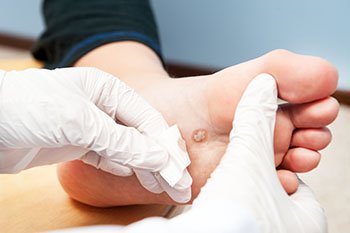
Toenails can fall off for a number of reasons, including injury, infection, or underlying health issues. Trauma, such as stubbing a toe or dropping something heavy on it, may cause blood to collect under the nail, called a subungual hematoma, which can lead to toenail loss. Fungal infections can also weaken the nail, causing it to become discolored, thickened, and brittle until it detaches from the nail bed. Skin conditions like psoriasis may damage the nail matrix and lead to nail separation. Certain health conditions, like diabetes or poor circulation from peripheral artery disease, can limit blood flow to the feet and make the nails more prone to falling off. Certain medications may affect nail growth and strength. A podiatrist can examine the affected nail and recommend proper treatment, including antifungal care, or monitoring circulation. If you have problematic toenails, it is suggested that you schedule an appointment with a podiatrist for appropriate treatment.
Toe pain can disrupt your daily activities. If you have any concerns, contact one of our podiatrists of Westland Foot & Ankle Specialists, P.C.. Our doctors can provide the care you need to keep you pain-free and on your feet.
What Causes Toe Pain?
Most severe toe pain is caused due to a sports injury, trauma from dropping something heavy on the toe, or bumping into something rigid. Other problems can develop over time for various reasons.
Toe pain can be caused by one or more ailments. The most common include:
- Trauma
- Sports injury
- Wearing shoes that are too tight
- Arthritis
- Gout
- Corns and calluses
- Hammertoe
- Bunions
- Blisters
- Ingrown toenails
- Sprains
- Fractures (broken bones)
- Dislocations
When to See a Podiatrist
- Severe pain
- Persistent pain that lasts more than a week
- Signs of infection
- Continued swelling
- Pain that prevents walking
Diagnosis
In many cases the cause of toe pain is obvious, but in others, a podiatrist may want to use more advanced methods to determine the problem. These can range from simple visual inspections and sensation tests to X-rays and MRI scans. Prior medical history, family medical history, and any recent physical traumatic events will all be taken into consideration for a proper diagnosis.
Treatment
Treatments for toe pain and injuries vary and may include shoe inserts, padding, taping, medicines, injections, and in some cases, surgery. If you believe that you have broken a toe, please see a podiatrist as soon as possible.
If you have any questions please feel free to contact our office located in Westland, MI. . We offer the newest diagnostic tools and technology to treat your foot and ankle needs.

Acute ankle sprains are a frequent injury in professional and non-professional baseball due to the high physical demands of the sport. These sprains often result from sudden movements such as sliding into bases, pivoting quickly, or landing awkwardly after a jump. The most common type involves the lateral ligaments on the outside of the ankle, but sprains can also affect the inner or high ankle ligaments. Players may experience pain, swelling, bruising, and instability. Diagnosis begins with a thorough physical examination to assess tenderness, range of motion, and joint stability. Imaging such as X-rays or MRI scans may be used to rule out fractures and evaluate ligament damage. If an ankle injury has occurred while playing baseball, it is suggested that you promptly consult a podiatrist who can accurately diagnose and offer effective treatment solutions.
Sports related foot and ankle injuries require proper treatment before players can go back to their regular routines. For more information, contact one of our podiatrists of Westland Foot & Ankle Specialists, P.C.. Our doctors can provide the care you need to keep you pain-free and on your feet.
Sports Related Foot and Ankle Injuries
Foot and ankle injuries are a common occurrence when it comes to athletes of any sport. While many athletes dismiss the initial aches and pains, the truth is that ignoring potential foot and ankle injuries can lead to serious problems. As athletes continue to place pressure and strain the area further, a mild injury can turn into something as serious as a rupture and may lead to a permanent disability. There are many factors that contribute to sports related foot and ankle injuries, which include failure to warm up properly, not providing support or wearing bad footwear. Common injuries and conditions athletes face, including:
- Plantar Fasciitis
- Plantar Fasciosis
- Achilles Tendinitis
- Achilles Tendon Rupture
- Ankle Sprains
Sports related injuries are commonly treated using the RICE method. This includes rest, applying ice to the injured area, compression and elevating the ankle. More serious sprains and injuries may require surgery, which could include arthroscopic and reconstructive surgery. Rehabilitation and therapy may also be required in order to get any recovering athlete to become fully functional again. Any unusual aches and pains an athlete sustains must be evaluated by a licensed, reputable medical professional.
If you have any questions please feel free to contact our office located in Westland, MI. . We offer the newest diagnostic and treatment technologies for all your foot and ankle needs.

Plantar warts are growths that appear on the soles of the feet, caused by the human papillomavirus, or HPV. They often develop in areas of pressure, like the heel or ball of the foot, and can sometimes combine to form a condition known as mosaic warts. Mosaic warts are clusters of multiple warts that spread out across a larger area, creating a patchy, rough surface. These warts can cause pain, especially when walking or standing for long periods. They often look like small, rough bumps with black dots in the center, which are blood vessels. The area susrrounding the wart may become hardened and calloused. A podiatrist can diagnose and treat plantar warts through various methods, including cryotherapy or freezing, laser treatment, and minor surgery. They may also provide topical treatments and advice on preventing the spread of the virus. If you have this condition, it is suggested that you schedule an appointment with a podiatrist for appropriate care.
Plantar warts can be very uncomfortable. If you need your feet checked, contact one of our podiatrists from Westland Foot & Ankle Specialists, P.C.. Our doctors will assist you with all of your foot and ankle needs.
About Plantar Warts
Plantar warts are the result of HPV, or human papillomavirus, getting into open wounds on the feet. They are mostly found on the heels or balls of the feet.
While plantar warts are generally harmless, those experiencing excessive pain or those suffering from diabetes or a compromised immune system require immediate medical care. Plantar warts are easily diagnosed, usually through scraping off a bit of rough skin or by getting a biopsy.
Symptoms
- Lesions on the bottom of your feet, usually rough and grainy
- Hard or thick callused spots
- Wart seeds, which are small clotted blood vessels that look like little black spots
- Pain, discomfort, or tenderness of your feet when walking or standing
Treatment
- Freezing
- Electric tool removal
- Laser Treatment
- Topical Creams (prescription only)
- Over-the-counter medications
To help prevent developing plantar warts, avoid walking barefoot over abrasive surfaces that can cause cuts or wounds for HPV to get into. Avoiding direct contact with other warts, as well as not picking or rubbing existing warts, can help prevent the further spread of plantar warts. However, if you think you have developed plantar warts, speak to your podiatrist. He or she can diagnose the warts on your feet and recommend the appropriate treatment options.
If you have any questions please feel free to contact our office located in Westland, MI. . We offer the newest diagnostic and treatment technologies for all your foot and ankle needs.

